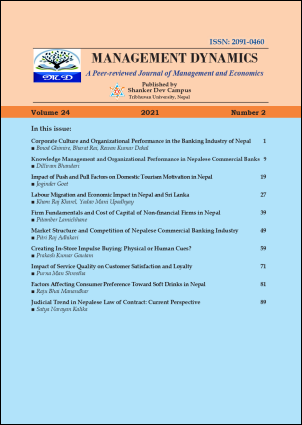Knowledge Management and Organizational Performance in Nepalese Commercial Banks
DOI:
https://doi.org/10.3126/md.v24i2.50033Keywords:
commercial banks, confirmatory factor analysis, knowledge management, organizational performance, structural equation modelingAbstract
Knowledge is taken as the most important resource by modern organizations. Hence, it should be managed properly to bring results. In relation to the above issue, this study aims to explore the relationship between Knowledge Management (KM) and Organizational Performance (OP) in commercial banks in Nepal. A survey research strategy has been adopted to achieve the research objective. This study is based on the population of 27 commercial banks in Nepal. Data has been gathered through structured questionnaires. The eight commercial banks were selected randomly, and the respondents were 107 officer-level employees. The statistical tools CFA and SEM were used for data analysis. CFA was used to develop and validate the model of KM, and OP and SEM were adopted to show their relationship. The finding of this study revealed that KM significantly affected OP, which opens a new avenue to management in commercial banks. This study highlights the contribution to understanding the importance of KM for the enhanced OP. The banks should emphasize knowledge as a key asset and formulate policies and systems accordingly.
Downloads
Downloads
Published
How to Cite
Issue
Section
License
Copyright © Research Management Cell, Shanker Dev Campus

